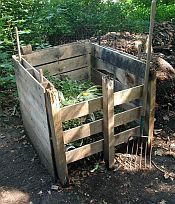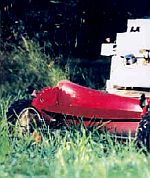Composting and Organics Recycling

"However small your garden, you must provide for two of the serious gardener's necessities, a tool shed and a compost heap." – Anne Scott-James
Organic materials that are source-separated from the trash are highly recyclable and should be thought of as a resource, not a waste. Significant increases in recycling rates can be achieved through composting and other organics recycling efforts. Connecticut DEEP has successfully focused efforts on establishing large-scale leaf composting facilities, promoting home composting and grasscycling, and sponsoring pilot programs to compost organics at schools and other institutions. These programs have helped keep food scraps, yard trimmings and grass out of the waste stream, reduce waste handling and disposal costs, return valuable nutrients to the soil, and reduce the need for chemical fertilizers, thereby decreasing non-point source pollution.
Connecticut has a history of organics recycling dating back to the late 1980's when the first recycling laws and regulations were passed, and leaves were designated as a mandatory recyclable item. Next on the horizon, the Department will be encouraging the commercial and institutional generators of organics, such as grocery stores, food processors, and universities to implement food scrap recycling programs, and also working toward encouraging the development of manufacturing facilities to turn those organics into compost products, clean energy, animal feed, and liquid organic fertilizer.
On this page:
- Composting at Home
- Composting at School
- Composting at Work
-
Businesses that Collect/Haul Food Scraps for Composting or Anaerobic Digestion
- Food Scraps Collection at Transfer Stations
- GrassCycling (Grass Clipping Management)
- Community Composting
- Pilot Projects and Studies
Related links:
- Permit Authorization Pathways for Food Waste Management
- CT Food Residuals Generation Map & Database
- Organics Laws & Regulations
- Large-Scale Organics Management Commercial/Municipal/Farm
- Composting & Wood Processing Facilities
- Food Waste Reduction Recovery
- Additional Organics Resources
Composting at Home
 By composting kitchen scraps and yard trimmings at home, and leaving grass clippings on the lawn, the volume of garbage you generate can be reduced by as much as 25%! Composting and grasscycling is practical, convenient and can be easier and less expensive than bagging these wastes and driving them to the transfer station, or paying a landscaper to take them away. Leaves and grass clippings are required to be recycled in Connecticut, and composting and grasscycling are great ways to comply.
By composting kitchen scraps and yard trimmings at home, and leaving grass clippings on the lawn, the volume of garbage you generate can be reduced by as much as 25%! Composting and grasscycling is practical, convenient and can be easier and less expensive than bagging these wastes and driving them to the transfer station, or paying a landscaper to take them away. Leaves and grass clippings are required to be recycled in Connecticut, and composting and grasscycling are great ways to comply.
- "Turning Your Spoils to Soil" Home Composting Video (CT DEEP)
- "Composting Has A-Peel" Home Composting Brochure (CT DEEP)
-
Home Composting Fact Sheet
Composting at School
- Eastern Middle School, Greenwich
- School Composting Manual Connecticut DEEP funded the production of this manual to provide a model for Connecticut schools to help them reduce their waste steam, increase recycling and to teach students about responsible waste management and the environmental advantages of composting. In the manual, you will find strategies for initiating a compost plan, bin design, routine steps of the composting operation, promotional activities, as well as an exhaustive section on lessons and resources. Although written specifically with K-12 schools in mind, the manual could be applicable to other small-scale institutional settings.
- K-12 Composting Resources
- College & University Composting Programs
Composting at Work
- A Work of Ort - How to Include Food Scraps in Your Office Recycling Program This document is a long version of a one-page fact sheet that was developed by CT DEEP Green Team for a workshop called “Going Green Makes Sen$e” which was presented on September 28, 2011 to State Agencies, Municipalities, and Businesses on greening their offices.
- DEEP's Office Food Scrap Composting Program Since 1997, CT DEEP has been separating and composting food scraps, food-soiled paper, and other organics from their office waste stream and composting them on-site. They have also joined the U.S. Food Waste Challenge.
Businesses that Collect/Haul Food Scraps for Composting or Anaerobic Digestion
- Action Waste Solutions – services residents in Black Rock, Fairfield, Norwalk, Weston, Westport
- All American Waste – services commercial businesses
- Black Earth Compost – services residents and commercial businesses in New London County region
- Blue Earth Compost – services residents, municipalities and businesses
- Casella– services commercial businesses
- Curbside Compost – services residential and commercial locations
- Divert, Inc. - services business, institutions and municipal transfer stations
- Peels and Wheels – services residents in New Haven, collecting food scraps processed by Peels and Wheels
- USA Hauling & Recycling – services commercial businesses and municipal transfer stations
Food Scraps Collection at Transfer Stations
- Darien
- Glastonbury
- Housatonic Resources Recovery Authority (New Fairfield, Newtown, Redding, Ridgefield)
- Mansfield
- Organics Recycling: Municipal Programs (webinar, July 2018)
GrassCycling
- "Don't Trash Grass!" Video (CT DEEP)
- "Don't Trash Grass!" Brochure (CT DEEP)
- "Don't Trash Grass!" Community Action Handbook (CT DEEP)
- Grasscycling Fact Sheet
- Grass Clippings Disposal Ban
Community Composting
- Expanding Community Composting in Connecticut (May 2019 webinar)
- New Haven Land Trust – Green Teens Turn to Composting
- Peels & Wheels Composting
Pilot Projects & Studies (CT)
- Bridgewater Organics Pilot
- Identifying, Quantifying, and Mapping Food Residuals from Connecticut Businesses and Institutions A GIS mapping tool and database where an entrepreneur, composter, hauler or waste manager can not only see where food generators in Connecticut are located, but can use the information to line-up new accounts, select the right collection vehicles, design efficient transportation routes, and choose logical locations to site new organics recycling facilities.
- Compost Erosion Control Study DEEP and the CT Department of Transportation (ConnDOT)collaborated on a two-year research project which demonstrated that compost was effective in controlling soil erosion, growing turf, and amending soil used in planting trees and shrubs. It resulted in ConnDOT incorporating compost into their "Standard Specifications for Roads, Bridges and Incidental Construction".
- Commercial & Institutional Food Scrap Pilot Projects A compilation of pilot projects that demonstrate food residual recycling from the commercial and institutional sector.
Content Last Updated September 26, 2025


 Leaving grass clippings on the lawn returns valuable nutrients to the soil, allowing you to reduce the amount of chemical fertilizer you need to apply. It is also against the law to dispose of them in the trash. Learn about all the other environmental, time and cost saving benefits of grasscycling through the following resources:
Leaving grass clippings on the lawn returns valuable nutrients to the soil, allowing you to reduce the amount of chemical fertilizer you need to apply. It is also against the law to dispose of them in the trash. Learn about all the other environmental, time and cost saving benefits of grasscycling through the following resources: